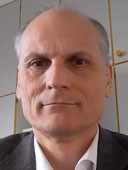4EU+ online seminars on "Artificial Intelligence Techniques, Applications, and Social Issues"
Physics-informed Neural Networks
25 February 2021
16:00 – 17:30 CET
Link to online seminars: Zoom
Abstract
Deep Neural Networks (DNNs) have demonstrated in many fields to be state of the art or superior compared to conventional techniques, only to mention image analysis where segmentation and classification of natural but also medical images is now dominated by this approach. Many phenomena in physics, economics, and engineering, to mention a few, are described by partial differential equations (PDEs). Formally, solvers of these PDEs approximate a function that solves both PDE and boundary conditions. Yet, often the solution of high-dimensional PDEs is very time-consuming despite efficient numerical techniques and parallelization. Early approaches to tackle this problem by deep learning use much example data for training. However, this requires the solution of the corresponding type of PDE many thousands of times with different parameter settings. An interesting alternative came up some years ago with the so-called Physics Informed Neural Networks (PINNs). These networks do not need training data, instead, they encode the conformance with the PDE and boundary condition with different sets of parameters in the loss function. In this respect, PINNs are approximating a family of functions that solve PDEs with different parameter settings. Hereby, one uses the effective interpolation strategy of DNNs to interpolate between sample parameter sets which are used to train the PINNs, respectively to determine their parameters by optimization. In this presentation, starting with some background in DNNs, we will find the basic approach, how the problem is tackled, how loss functions are realized and how to use them in the context of the SimNet framework of Nvidia, an upcoming framework that allows to easily model PINNs.
Short bio
Prof. Dr. Jürgen Hesser is Professor at the Heidelberg University. He has been deputy professor at the University of Mannheim and guest lecturer at the Harvard University. He received his PhD degree in physics at the Heidelberg University in 1992.
His main research interests are in data analysis and modeling with specific focus on medicine. Main topics are inverse problems for image reconstruction, restauration, and analysis, simulation, and modeling as well as instrumentation. Results have been published in more than 150 papers in international journals, books, and conference publications.
